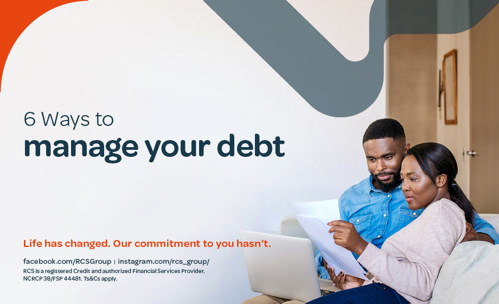6 Ways to manage your debt
17 AUGUST 2023
There are lots of reasons why you might find yourself in debt, but there’s always steps you can take to get yourself out. With a recession at hand and the Covid-19 pandemic leading to rising job and salary cuts, businesses are taking a knock and personal finances are increasingly becoming strained. Added to that are life’s big emergencies or finding yourself overspending for months, and getting out requires planning. Here’s where to start.
With a recession at hand and the Covid-19 pandemic leading to rising job and salary cuts, businesses are taking a knock and personal finances are increasingly becoming strained. Added to that are life’s big emergencies or finding yourself overspending for months, and getting out requires planning. Here’s where to start.
1. Take control of your spending.
Just because you’re in debt doesn’t mean you can’t get into more debt. This is where a budget comes in. Good thing is that it’s never too late to learn to budget effectively.
2. Write down who you owe and how much.
Knowledge is power. By breaking down your debt, you can see its full extent. This can also help you determine which debts to pay first. Paying off small debts first can mean fewer debts to balance and frees up more cash to add to bigger expenses.
3. Always pay the minimum, but pay more where possible.
Minimum payments are how much you need to pay every month. If that’s all you’re able to pay, that’s fine. But remember, debt is expensive. Delaying paying it off will only cost you more money on interest and fees. It would be wise to put extra money from a work bonus or a tax refund towards your debt. Learn how to pay your RCS accounts from anywhere.
4. Make a plan to pay.
Putting your plan in writing is a particularly good way to make sure you actually pay. Then all you need to do is make the payments. Some people like to take this a step further and share their plan for accountability. For you, this might mean telling a friend who is also trying to work through their debt. Some people find it helpful to blog about their journey out of debt. On social media, you can search for hashtags like #debtfree or #financialindependence. By watching someone else’s journey, you can learn from their successes and feel motivated.
5. Build an emergency fund.
An emergency fund is not only about feeling ready for an emergency. It’s also a really important way to keep yourself out of future debt. In the case of an accident or a surprise expense, your emergency fund will keep you from needing to borrow money.
6. Celebrate your successes.
It’s important to celebrate when you’ve made progress towards paying off your debt. Keeping track of the progress you make is a great way to see how well you’re doing and to encourage yourself when you see how far you’ve come.
Learn more financial wellness tips.
MORE ARTICLES ABOUT
RELATED ARTICLES

Education
28 AUGUST 2025
SA Research: How Parents Impact a Child’s Financial Intelligence

Education
12 JUNE 2025
Cultivating Tomorrow's Leaders: Equipping Young South Africans for Life’s Challenges

Education
28 MARCH 2025
